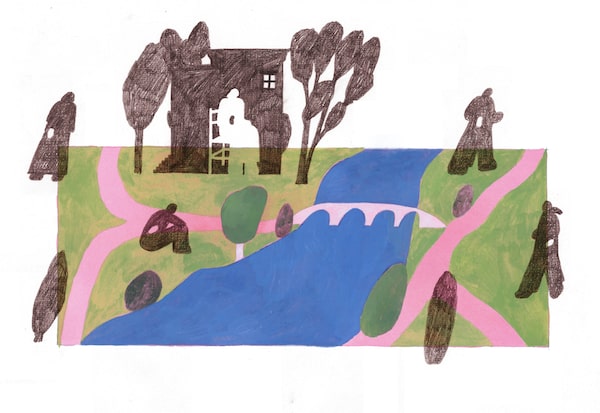First Person is a daily personal piece submitted by readers. Have a story to tell? See our guidelines at tgam.ca/essayguide.

Illustration by Mary Kirkpatrick
Some days, there’s nothing better than escaping into someone else’s mind. Mexican painter Frida Kahlo is known for her raw and confessional artworks, most of which gave a panoramic view into her thoughts, dreams, nightmares, fears and hopes. As an art historian, I can appreciate Kahlo’s oil-on-canvas proclamations about the beauty and brutality of life, illness and pain; I am especially drawn to one work in particular: What the Water Gave Me. In it, we see her legs submerged in a bathtub full of tiny floating images that represent key moments in her life, following a traffic accident as a young woman. This painting has become a metaphor for my present circumstances – and a reminder that even in dire situations, there can still be grace.
You see, at 39, I am living with End-Stage Liver Disease (ESLD) and urgently require a liver transplant. Thankfully, because the liver regenerates, I can receive a lobe, or half a liver, from a living donor and it will grow to full size in me, and completely regenerate in the donor.
My health crisis began a decade ago after developing sepsis, which required nearly two weeks in hospital. I was diagnosed with Primary Sclerosing Cholangitis (PSC), a rare autoimmune liver disease with no cure that slowly covers my liver in layers of scar tissue, ultimately turning it into stone.
Despite my condition, I have managed to live a busy and joyful life this past decade – some days, my health was so good that I forgot I was so ill. Shortly after my diagnosis, I moved to England and completed my PhD in art history, at the University of Cambridge. There, I made wonderful friends, laughed endlessly, saw, studied and taught about beautiful art. I remember the thrill of seeing the Unicorn Tapestries at the Cluny Museum during a research trip to Paris; watching the sunrise, sprawled on the bowling green in a ballgown after a May Ball; the sugar rush of consuming too many jaffa cake biscuits during Sunday tea in our graduate parlour; and the intensity of non-stop post-Brexit conversations in the pub.
But PSC is a sly beast because it tricks you into thinking you’re out of the woods. It can be patient, waiting for you to take your eyes off it for just a split second and then it pounces.
In 2019, it pounced. While waiting to defend my dissertation, I decided to return to my hometown of Toronto. Shortly after arriving, I began to develop devastating symptoms that required 17 days in hospital. It wasn’t until two months later that I was finally well enough to go back to Cambridge.
Almost a year later, having defended my thesis, I returned to Toronto, this time to ride out the pandemic. Once again, I found myself exhibiting terrifying symptoms like spontaneous internal bleeding that required numerous hospitalizations and medical procedures. It was becoming clear that this beast of an illness was racing full tilt. Somehow, though, I once again became stable and well enough to take up a postdoctoral fellowship in Florence, where I spent nearly a year doing everything I did in Cambridge – except in Italian – and it was glorious.
Then in October of 2022, the disease decided it was tired of being in the wings and elbowed its way to centre stage. During a routine MRI, my doctors saw what looked like potentially cancerous growths/lesions on my liver. I moved back to Toronto immediately to undergo an emergency biopsy. Afterward, I was referred to the liver transplant team for immediate evaluation.
Last June, I was listed on the Ontario Transplant List. I am currently waiting and searching for a living liver donor with blood type O+ or O- to give in Toronto.
Despite the horrendous nature of my illness, the urgent need for a transplant and the uncertainty of a timeline, liver disease has also given me tremendous gifts. I have returned to a city that has always been so generous and good to me. I am supported by my colleagues at the University of Toronto, in the department of art history, where I work as a researcher and lecturer. I have reconnected with amazing friends.
Liver disease has allowed me the time and space to slow down and take a rigorous personal inventory; to re-evaluate my views, ethics, ambitions and motivations. It has also shown me a path of service as I am now a passionate advocate for organ donation awareness, which includes liver disease education and living organ donation awareness. I have found kindred spirits in the transplant community, who have welcomed me with open arms and are among my biggest cheerleaders.
If this is what End-Stage Liver Disease has given me, then I am grateful. I am all the richer for what I have received – this is what the “water” gave me. This is what keeps me afloat as I actively search for my liver donor match and the transplant that will happen.
Stephanie Azzarello lives in Toronto.